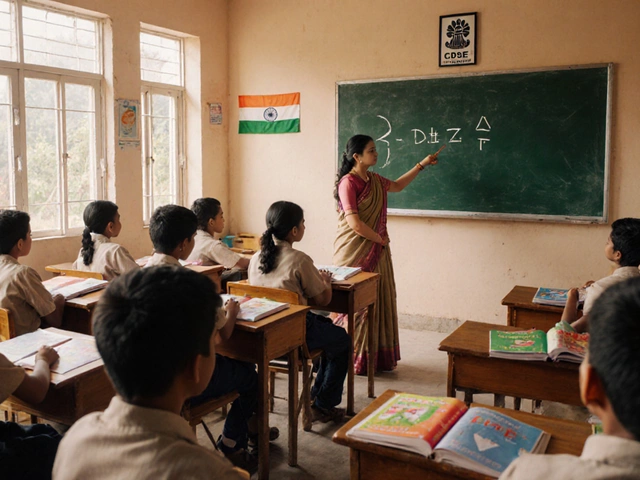
Most students in India have a fair idea that some exams are brutal. But if you’re in the thick of the CBSE syllabus, just knowing which exams are the hardest can save you a ton of stress and help you zero in on your goals. It’s not always about having genius-level skills—you need the right plan, a clear sense of what you’re up against, and maybe a story or two of people nailing it when the odds looked terrible.
Some of these exams are almost like urban legends. Getting through them takes more than late nights and coffee. You’re battling against cutoff rates so low they might as well be your phone battery on a bad day. So why do smart students from across the country dream of facing these monsters? Funny enough, it’s because if you crack them, you sometimes set up your whole career from one result.
- The Big Three: Meet the Monsters
- Why Are These Exams So Tough?
- Success Rates: Crack or Crack Up?
- How CBSE Syllabus Fits In
- Smart Prep Tips That Actually Work
- Real-Life Stories and Final Thoughts
The Big Three: Meet the Monsters
So, let’s put names to the pain. If you ask any CBSE student to list the exams that stretch their nerves, you’ll hear about these three almost every time: IIT-JEE Advanced, NEET-UG, and UPSC Civil Services Examination. If you’re dealing with the CBSE syllabus, these are the ones everyone gossips about in school corridors, and for good reason.
First up, JEE Advanced. If you’re gunning for an IIT, this is your battleground. Each year, over 1.5 lakh hopefuls take a shot, but only about 16,000 manage a seat. The questions are unpredictable, they demand deep thinking, and your speed matters as much as your accuracy. What’s extra brutal? Even being a topper in board exams isn’t a ticket through this one.
Then there’s NEET-UG, the national ‘doctor factory’ gatekeeper. Imagine more than 24 lakh students fighting for just about 1 lakh government MBBS seats in 2024. You basically have to be in the top 4% just to get a government spot. The crazy competition means one mistake in bubbling your OMR can be all it takes to sink your dream.
And finally, the monster-in-chief: UPSC Civil Services Exam. This isn’t just about being smart—it’s about having patience, discipline, and insane staying power. Over 12 lakh people register each year, and only about 1,000 get shortlisted for top jobs like IAS, IPS, and IFS. The thing is, it takes almost a year, with Prelims, Mains, and Interviews. It’s not just your memory on the line, but your personality and problem-solving skills too.
| Exam | Number of Aspirants (2024) | Approx. Seats | Selection Rate |
|---|---|---|---|
| JEE Advanced | 1.5 lakh | 16,000 | ~10% |
| NEET-UG | 24 lakh | 1 lakh (Govt. MBBS) | ~4% |
| UPSC Civil Services | 12 lakh | ~1,000 | ~0.08% |
All three hit in different ways, and they’re not just hard because the paper is tough. It’s the numbers, the competition, and the pressure to make every mark count. Knowing what you’re up against is half the battle—now you can see why students call these the real monsters of the Indian exam world.
Why Are These Exams So Tough?
It isn’t just hype—these exams in India are a different beast. First up, there’s the sheer number of candidates. For example, in 2024, over 20 lakh (that’s two million!) students registered for NEET, and around 11 lakh went for JEE Main. But the seats? Only a tiny fraction end up making the cut.
What really puts the pressure on is the competition. When you sit for these tests, you’re up against some of the brightest students in the country, all armed with years of coaching and preparation. The exam pattern adds to the tension: tricky multiple-choice questions, negative marking, and a syllabus that feels never-ending.
| Exam | Applicants (2024) | Success Rate |
|---|---|---|
| JEE Advanced | 1.8 lakh (qualified) | ~2% |
| NEET | 20 lakh | ~4.5% |
| UPSC CSE | 11 lakh | <1% |
Add the fact that these exams test more than bookish knowledge. You need solid time management, a knack for quick thinking, and the ability to deal with stress. The CBSE syllabus covers a lot, but these tests often go even deeper, tossing in curveballs and concepts you might have only seen once in a while during class.
- Negative marking: Get a question wrong, lose marks. That alone changes how students approach risky questions.
- Speed plus accuracy: JEE and NEET in particular are all about solving tricky problems in minutes. A slow approach just doesn’t work.
- Mental stamina: The UPSC mains exam, for example, stretches over several days. You need more than just good memory—you need the ability to stick with it, day after day.
No wonder even brilliant students sometimes slip up. It’s a combo of tough questions, fierce competition, and massive pressure.
Success Rates: Crack or Crack Up?
Let’s cut to the chase. When folks hear stories about these exams being nightmares, they’re not exaggerating. The numbers don’t lie, and for students on the CBSE syllabus, those numbers can be both scary and motivating. Here’s a look at the actual odds when it comes to the big three toughest exams in India—JEE Advanced, NEET UG, and UPSC Civil Services.
The reason these exams freak everyone out? It’s all about the sheer competition and mind-blowing low success rates. You’re not just going up against your classmates; you’re competing with lakhs of students who put in years of serious prep. Just take a look at these figures from the most recent rounds:
| Exam | Total Applicants (2024) | Qualified | Selection Rate |
|---|---|---|---|
| JEE Advanced | 1,95,000 | ~43,000 | 22% |
| NEET UG | 24,00,000 | 11,45,000 | 47% |
| UPSC Civil Services | 12,00,000 | ~2,600 (Final Selection) | 0.21% |
NEET’s selection rate seems higher if you go by the numbers, but here’s the catch—not all those who qualify get a good medical college. For top government colleges, your chances are way lower.
With JEE Advanced, even just qualifying is tough. Out of the lakhs who try their luck, only about a fifth actually make it. And getting into old IITs is a battle within a battle.
UPSC Civil Services is a beast of its own. Imagine over a million people aiming for barely a couple thousand spots. It’s so competitive, most candidates have to try multiple times. A lot of successful toppers didn’t make it on their first or even second try.
- If you’re from the CBSE syllabus, don’t get stressed by the odds. Your background gives you a solid foundation, especially in science and maths.
- The biggest secret? Learn from the numbers. You don’t have to beat all 10 lakh candidates—just be a bit better than most.
So when you hear just how stiff the odds are, don’t let it paralyze you. It’s normal to feel a bit freaked out. Just remember: everyone who cracks these exams started where you are right now, staring at the same intimidating stats.

How CBSE Syllabus Fits In
If you’ve come up through the CBSE system, you’ve already had a sneak peek at a lot of the concepts that pop up in the toughest exams in India. Take JEE Advanced, NEET, or UPSC—CBSE textbooks and sample papers practically set the stage for these tests. The questions might get way tougher, but the core stuff is all there.
CBSE is known for its straightforward approach. Instead of just making you memorize theories, it pushes you to actually understand what’s going on. That’s a huge help when you start prepping for competitive exams that love to twist questions in new ways. Most of the reference material for these national exams is built right around the CBSE syllabus.
Here’s a look at how much the CBSE syllabus covers for some of India’s toughest exams:
| Exam | CBSE Syllabus Overlap | Extra Topics Required |
|---|---|---|
| JEE Advanced | About 70-80% | Problem-solving, advanced applications |
| NEET | 80-85% | Some concepts from NCERT, extra depth |
| UPSC Civil Services Prelims | 40-50% | Current affairs, Indian polity, world geography |
Getting a strong grip on the CBSE curriculum means you’ll have the basics covered. But don’t be fooled—you’ll still need to learn beyond your school books if you want to compete with the best. Especially for exams like UPSC, the questions go way off the standard path.
Most serious aspirants start with NCERT books (which CBSE recommends) because the language is simple and the ideas are explained right from basics. Even top rankers in JEE and NEET swear by NCERT for theory before moving on to thick reference books or online test series. If you’re feeling lost, stick to your CBSE basics first—then level up.
- Don’t skip past the exercises in the back of your textbooks. They aren’t just for homework—they’re exam basics.
- Watch out for areas where your textbook just skims the surface. In competitive exams, these are the parts you’ll get grilled on.
- Try to solve CBSE previous years’ board papers under timed conditions, then move on to the tougher mock tests.
At the end of the day, the CBSE syllabus is like your launchpad. It decides how high you’ll jump, but how far you go is all up to extra effort and smart learning outside the usual school walls.
Smart Prep Tips That Actually Work
Getting through the toughest exams in India isn’t about grinding nonstop or memorizing entire books. It's about working smart and picking up strategies that match the exam pattern and cut-off trends. Here’s how you up your game:
- Start with the Basics: Build your foundation before you even touch advanced stuff. The questions often twist simple concepts in tricky ways. If you’re solid on the basics, you won’t get rattled when the exam throws a curveball.
- Stick to the Syllabus: Most exam toppers say don’t waste time on random topics. Check the official syllabus—especially the CBSE syllabus—and focus only on what matters.
- Mock Tests Are Non-Negotiable: Weekly timed mocks are game-changers. They copy real exam settings and help you spot your weak zones. For example, students aiming for JEE or NEET usually attempt more than 40 full-length mocks during their prep.
- Analyze Your Mistakes: After every test, go through your wrong answers. Find patterns—were they silly mistakes, or did you genuinely not know the concept? Fix those before moving forward.
- Keep a Study Schedule But Stay Flexible: Create a simple daily plan, but don’t freak out if you fall behind. Make small changes based on what’s working for you.
Here’s a quick look at average prep times and typical resources used by toppers:
| Exam | Months of Preparation | Mock Tests Attempted | Key Resources |
|---|---|---|---|
| JEE Advanced | 18-24 | 40+ | NCERT, previous year papers, test series |
| UPSC CSE | 12-18 | 30+ | NCERT, newspapers, standard books |
| NEET | 12-18 | 40+ | NCERT, question banks, mock series |
Another underrated move? Study groups. Toppers often discuss tough questions with friends or seniors. It helps clear doubts quickly and keeps you on your toes. And if you mess up? Don’t panic. Every topper flunks a few tests before getting it right. The real secret is not giving up after seeing a bad score.
Real-Life Stories and Final Thoughts
It’s easy to toss around terms like “toughest exam,” but nothing hits home like stories from folks who’ve survived them. Take Riya, who cracked the JEE Advanced on her second try after totally bombing her first attempt. Instead of giving up, she switched up her study strategy—less cramming, more practice papers, and weekly check-ins with a mentor. She said the thing that really helped was understanding where she lost marks and working just on those.
Then there’s Anand, who didn’t just ace NEET but scored in the top 100. He had a super disciplined routine, yeah, but honestly, what made the biggest difference? Regular group study and quick revision notes. He found that discussing doubts with friends, instead of going solo, cleared up tough concepts a lot faster.
Let’s not forget about the UPSC Civil Services Exam. Ankita cleared UPSC on her third shot. She says most folks underestimate how important healthy habits are—her top tip was keeping seven hours of sleep steady during intense prep months. She swears by taking breaks every hour, even if it’s just to get up and grab some water. Clearly, small stuff adds up.
Curious about what your odds look like? Check out this quick table showing recent stats for these big three:
| Exam | Total Applicants (2024) | Selection Rate |
|---|---|---|
| JEE Advanced | 2,50,000 | ~2% |
| NEET | 24,00,000 | ~7% |
| UPSC | 13,00,000 | <1% |
These numbers might look scary, but the takeaway is simple: consistency and focusing on your weak areas actually works better than burning yourself out.
- Revise smarter, not longer.
- Talk out doubts with friends or teachers.
- Track your progress and change tactics if something’s not clicking.
- Don’t mess up your sleep or skip meals. It matters.
The journey through these toughest exams is intense. But if you keep things real, set small, manageable goals, and learn from what others did right (and wrong), you’re way more likely to get the result you want. These tests might be super tough, but they’re definitely not unbeatable.







